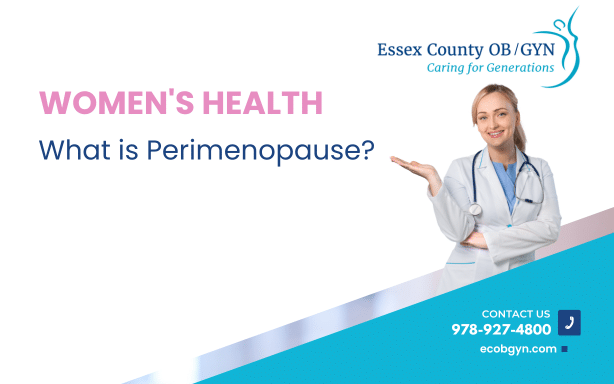What is Perimenopause?
Perimenopause is the transition period leading up to menopause. It typically starts about five years prior to the final menstrual flow and lasts anywhere from two to ten years. Women may experience many different symptoms during this time, including hot flashes, mood swings, vaginal dryness, weight gain, sleep disturbances, night sweats, fatigue, decreased libido, and sometimes worsening anxiety or depression.
What are the Symptoms of Perimenopause?
During perimenopause, you may notice that your period starts earlier or later each month, lasts shorter or longer, or becomes irregular. You may begin experiencing hot flashes and night sweats during the second half of your cycle, which affects about half of all women during this stage. Other common signs of perimenopause include:
- Mood changes
- Changes in sexual desire (libido)
- Trouble concentrating
- Headaches
- Night sweats
- Hot flashes
- Vaginal dryness
- Trouble with sleep
- Joint and muscle aches
- Heavy sweating
- Frequent urination
- Premenstrual anxiety or depression
How is perimenopause treated?
Perimenopause does not need to be treated unless symptoms are bothersome. In general, women do not need to “check hormones” to initiate treatment. For most women, hormone levels of estrogen, progesterone, and testosterone remain in the normal range in perimenopause and treatment can be started without extensive laboratory workup. If women are having irregular periods or significant vasomotor symptoms, we may recommend checking a thyroid test (TSH).
Common treatments may include:
- Wearing layered clothing to help with hot flashes
- Exercise, meditation, and yoga practice to help with stress and sleep
- Hormonal treatments, such as hormonal contraceptive pills, levonorgestrel IUDs, or hormone replacement therapy to help stabilize estrogen and progesterone levels, treat vaginal dryness, or to help manage irregular or heavy periods
- Antidepressants for treatment of hot flashes, premenstrual symptoms, or perimenopause-associated mood swings
- Talk therapy or physical therapy to help treat low libido or conditions that cause discomfort with intercourse
Your healthcare provider may suggest other lifestyle changes:
- Eat a healthy diet with fruits and vegetables and whole grains.
- Get at least 1,000-1,200 mg of calcium and 800 IU of Vitamin D each day through diet or supplements.
- Exercise regularly. Exercise benefits your heart and brain health, and can improve sleep.
- Talk with your life partner about what you are experiencing. Good communication is the key to continuing to have a healthy intimate relationship.
- Find what triggers your hot flashes (for example, alcohol, coffee, or tea) by keeping a record.
- Discuss the use of other treatments in relieving symptoms with your healthcare provider.
- Talk to your healthcare provider before using any herbal supplements.
- Women should continue to use contraception until they are in menopause (1 year after their last period). Although ovary function is changing, women can still ovulate and become pregnant.
What is Menopause?
Menopause is when a women’s periods stop – specifically, a woman becomes menopausal when she has had one year without a period. But it doesn’t happen overnight. Perimenopausal symptoms can occur several years leading up to and several years after menopause.
The average age for menopause is 51, but it varies based on factors such as genetics, lifestyle habits, and hormone levels. The age range for when women enter menopause is as early as age 45 and as late as age 55. During this time, your body goes through some pretty big changes. Your ovaries gradually produce less estrogen, progesterone, and testosterone, which in addition to changes in sleep, vasomotor symptoms, and libido can decrease your metabolism, increase your risks for heart disease, and accelerate loss of bone density. As women age, regular screening for cervical cancer, breast cancer, colorectal cancer, high cholesterol, and bone density are recommended. We encourage women who are perimenopausal to continue to see their gynecologist annually to keep up to date with health screening, ask questions about perimenopause, and discuss treatments to help with perimenopausal symptoms.
If you want to learn more about perimenopause, treatments for perimenopause, or care in menopause, please contact Essex County OB/GYN at 978-927-4800.
Are you wondering if you’re in perimenopause? We’re happy to help you figure things out and go over all the options with you. Get in touch to schedule an appointment, and you can put your perimenopause questions to rest.
